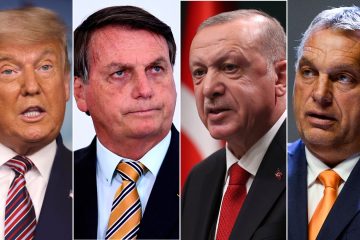
Finger-Pointing Across the Channel: EU as ‘Other’ in UK Government’s Post-Brexit Discourse
Despite leaving, the EU remains the UK’s significant, constitutive other. Even post-Brexit, the British sense of self is being claimed by defining the EU as ‘Other’. Naturally, since 2016, the character of this ‘Other’ has evolved. Following the referendum, and especially Brexit itself, the UK-EU relationship has undergone a transformation of redefining each/the other. One might have expected that, once the UK had left the EU, the mutual relationship would run more smoothly. Yet, the opposite has been the case. Boris Johnson’s government was keen to pick fights with the EU and “regularly and deliberately spark arguments” with it. Since the UK (nominally and practically) left the EU on 31 December 2020, the mutual relationship has been marred by numerous …

Assessing the Performance of Minority Governments in Europe: The Devil is in the Detail
In 1974, when Harold Wilson formed the UK’s first minority government in 45 years, observers like Anthony King optimistically claimed that “[m]inority rule can work”. This challenges the oft-cited view of Strøm that minority governments are “counterintuitive phenomen[a] in the world of parliamentary democracy”. Today, minority governments constitute approximately one third of governments in established parliamentary democracies, globally. This ‘counterintuitive’ statistic raises the following questions: When can minority rule work? Under which conditions are minority cabinets effective? How have minority rule governments evolved over time? To answer these questions, I focus on three cases – Sweden, Norway, and Denmark – where minority cabinets are the predominant form of government. Ultimately, I argue that existing measures to assess the performance of …

OxPol Blogcast. Politics, Re-Imagined — Media, Identity and Misinformation with Rasmus Kleis Nielsen
How can media organisations reach those who feel the news is not for them? And is our current age of fake news fundamentally different from the past? Tune in as our host Cassandra van Douveren speaks to Dr. Rasmus Kleis Nielsen, the Director of the Reuters Institute for the Study of Journalism and a Professor of Political Communication at the University of Oxford to discuss these questions. Rasmus’ work focusses on the changing role of the news and media in our societies. His recent book, Avoiding the News: Reluctant Audiences for Journalism (2023), written with Benjamin Toff and Ruth Palmer, explores why particular audiences are reluctant to follow the news and how this can be addressed. He has also written …

Israel’s Strategic Dilemma
Debate in Israel about the government’s strategy in the Gaza war is heating up. While a majority of Israelis still support the war in Gaza, a growing minority are questioning whether continuing the war against Hamas will bring greater security to Israel or stability to the region, arguing that the government’s military campaign will perpetuate a conflict damaging all parties – not least Israelis themselves. Benjamin Netanyahu’s failure to bring home the Israeli hostages has reinforced tensions and doubt among the public. But continuing the war suits the incumbent government, enabling them to remain in power. Paradoxically, it also suits Hamas. Only when a majority of Israelis themselves conclude that the current strategy puts at risk rather than guarantees their …

Identity Capital and the North-South Gap in Explaining Populism
The literature on populism in the 21st century often assumes that far-right leaders draw their support from voters who have lost out to globalisation. This is the case among low-skilled, white workers in Global North democracies, including the United States. But, there are also meaningful occurrences of backlash against the political establishment and liberal values in parts of the Global South that have clearly benefited from the post-Cold War trade openness. For instance, two of the largest democracies in the developing world have been shaken by right-wing movements that came to power with the support of the winners of economic liberalisation. In Brazil, Jair Bolsonaro, a former army captain, won the presidency in 2018 with the support of agribusiness exporters …

Russia’s War in Ukraine and Women’s Agency
Despite the unabated destruction and devastation caused by Russia’s full-scale invasion of Ukraine, the war also opened new doors for development and a leap in women’s agency. Ukraine is fundamentally rethinking gender roles, expanding the opportunities of its citizens, and serving as a model for other countries. The Armed Forces of Ukraine have become the first place where women’s voices have been amplified. Ukraine has allowed women to participate in military operations to guarantee national security and defence, as they repel and deter armed aggression by Russia. Currently, 40,000 women serve in the Armed Forces, including those in combat roles. Furthermore, 8,000 women hold officer positions, and 5,000 serve on the front lines. In the near future, a separate combat …

Review of Sehenden Auges: Mut zum Strategischen Kurswechsel (With Eyes Wide Open: The Courage for a Strategic Course Change) by Dr. Stefanie Babst
Just over a year after Russia’s invasion of Ukraine in February 2022, Dr. Stefanie Babst, who has held several senior positions at NATO, including heading its Strategic Foresight Team from 2012 to 2020, has published her latest book, Sehenden Auges: Mut zum Strategischen Kurswechsel (With Eyes Wide Open: The Courage for a Strategic Course Change). The book is an important call for critical reflection and course correction among NATO partners and a plea for the West to continue to support Ukraine, not least in its own interests. The first part of the book contextualises Russia’s war on Ukraine. The author explains Putin’s rise to power, the workings of his power apparatus, and Moscow’s strategic objectives. Babst provides the reader with …

A New Battleground: Russia’s “Grey Zone” Warfare in the Sahel
As Russia’s invasion of Ukraine enters its second year, the Wagner Group has been expanding its Kremlin-backed footprint across the globe. In particular, the mercenary network has been deploying forces in Africa’s Sahel region, revealing how Moscow is strategically blurring the line between “anti-terror” operations, security-for-resources tradeoffs, and covert political influence. In recent months, U.S. officials have accused Wagner of exploiting resources in the Central African Republic (CAR), Mali, Sudan, and beyond in an effort to fund Putin’s “war machine” in Ukraine — a charge Moscow dismissed as “anti-Russian rage”. Beyond the Ukraine crisis, however, the group’s activities and atrocities are painting a dire picture of Russia’s long-term strategy to destabilise Western relationships and gain a foothold in the African …









